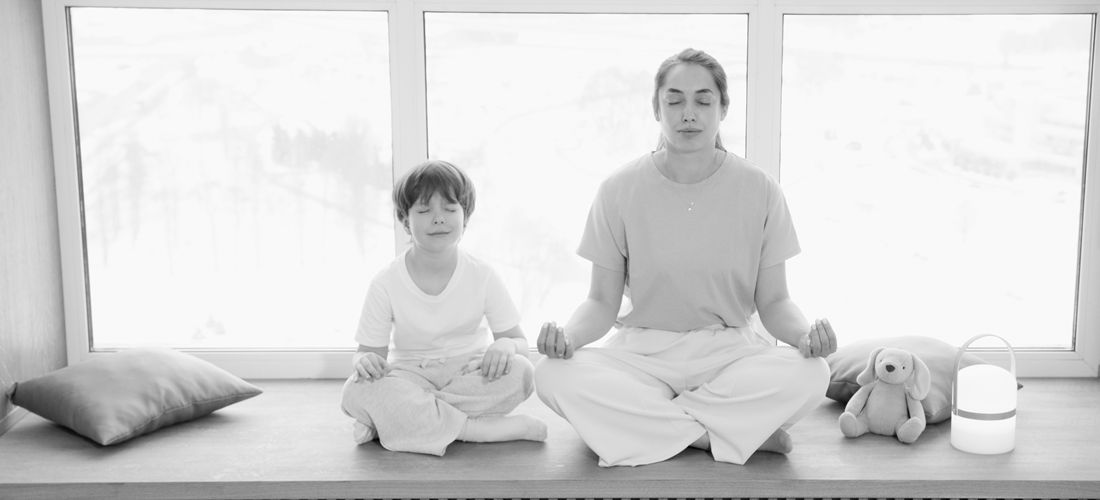Introducing mindfulness to your children may seem like a daunting task, but rest assured, it can be an incredibly rewarding journey. Welcome to our latest post on the benefits of mindful parenting, a topic that is fast gaining attention in the parenting world. Fostering mindfulness in kids not only instills peace and calm, but it also empowers them with tools to navigate their emotions and the world around them. As parents, our role isn’t just to provide for our children’s physical needs, but also to nurture their mental and emotional health. In this blog post, we’ll delve into some of the unseen rewards of encouraging mindfulness in your little ones, helping them grow into balanced, thoughtful adults.
Mindfulness, often described as the practice of being fully present and engaged in the moment, can play a significant role in a child’s growth and development. It cultivates a sense of awareness and understanding of one’s thoughts, feelings, and surroundings, without judgment. This awareness not only helps children manage stress and anxiety but can also enhance their cognitive and academic performance.
The role of parents in instilling mindfulness in children is paramount. As the primary influencers in their kids’ lives, parents can model mindful behavior themselves, thus teaching by example. This process is often referred to as ‘mindful parenting’. Mindful parenting involves responding to your child’s needs with flexibility, openness, and kindness. It isn’t about achieving perfection, but rather about fostering a deeper connection with your child and helping them develop tools to navigate life with resilience and equanimity.
Benefits of Mindful Parenting for Children
Mindfulness offers a myriad of benefits for children, especially when incorporated into a mindful parenting approach. Here are some key benefits:
1. Improved Emotional Regulation
Practicing mindful parenting can significantly improve a child’s emotional regulation. When parents model mindfulness, they help their children become more aware of their emotions. This increased self-awareness leads to improved emotional regulation as children learn to understand, identify, and manage their feelings instead of reacting impulsively.
They start to see that emotions, even the intense ones, are temporary and manageable. This way, mindfulness fosters resilience, enabling children to navigate emotional highs and lows with ease and confidence. In essence, mindful parenting doesn’t just equip children with the skills to handle their emotions effectively; it’s an enlightening journey that fosters emotional intelligence to last a lifetime.
2. Enhanced Focus and Attention
One of the standout benefits of mindful parenting is enhanced focus and attention in children. When you engage in mindful parenting, you’re teaching your child to live in the present, to focus on what’s happening right now. This ability to stay “in the moment” can vastly improve a child’s concentration skills.
Instead of their minds wandering to the past or future, they’ll learn to focus on their homework, their chores, or the basketball game they’re playing. This improved focus can benefit them in their academic pursuits and personal development, setting them up for success in life. It’s a remarkable advantage, and it’s all thanks to the power of mindful parenting.
3. Reduced Stress and Anxiety
When you practice mindful parenting, you can enjoy a significant decrease in your levels of stress and anxiety. Imagine dealing with your child’s tantrums or relentless questions without losing your cool. That’s the magic of mindfulness. By being present in the moment, you sidestep the anxiety that comes from worrying about past mistakes or future concerns.
This mindful approach helps you perceive your child’s actions through a more empathetic lens, defusing potential stressors and promoting a calmer, more harmonious family environment. The result? You’re not just less anxious and stressed; you’re actually a more effective, loving parent.
4. Increased Self-Awareness
With mindful parenting, your child learns to develop an increased self-awareness. This is no small feat. Imagine a child who can recognize their own feelings, understand why they’re feeling a certain way, and know how these emotions affect their behavior.
Such self-awareness helps them understand their own needs better, making them more self-reliant. It also teaches them empathy as they understand that others also have feelings and needs similar to their own. Not to mention, children with a heightened sense of self-awareness are more adept at handling conflict, navigating social interactions, and making well-informed decisions.
Truly, mindful parenting can be a powerful tool to equip your child with the self-awareness required to thrive in this ever-changing world.
5. Better Coping Mechanisms
Practicing mindful parenting doesn’t just benefit you, it’s a win for your kids too. One of the significant advantages is the development of better coping mechanisms in children. When you parent mindfully, you teach your children to experience their feelings fully, understand them, and respond to them, rather than react impulsively.
This nurtures emotional intelligence, equipping them with the ability to handle their feelings and stress effectively. Imagine your child being able to navigate through a wave of anger, a surge of fear, or a burst of excitement with grace and resilience. That’s the power of the coping mechanisms they can develop through mindful parenting.
6. Enhanced Empathy and Compassion
Mindful parenting can significantly enhance empathy and compassion in children, acting as a cornerstone for their emotional development. As a parent, when you model mindfulness—staying present, listening attentively, and responding thoughtfully—you demonstrate empathy. In doing so, you show your child how to understand and share the feelings of others.
This practice often translates into your child displaying greater compassion, not just with family members, but also with peers at school or in other social situations. They learn to consider others’ perspectives, leading to healthier, more empathetic interactions.
As a result, children nurtured with mindful parenting often grow into well-rounded adults, capable of forming deeper, more meaningful relationships.
7. Improved Sleep Patterns
In the hustle and bustle of today’s fast-paced world, getting a good night’s sleep is often overlooked, but it’s particularly crucial for children’s growth and development. Mindful parenting can play a key role here.
When you, as parents, infuse mindfulness into the bedtime routine, it creates a calm and soothing environment that’s conducive to sleep. This includes practices such as mindful reading, guided relaxation or even simple, focused breathing. These activities help to quiet the mind, easing the transition from daytime hustle to nighttime restfulness.
As a result, children are more likely to enjoy improved sleep patterns – falling asleep faster, sleeping more deeply, and waking up less frequently during the night. Not only does this benefit their physical health, but it also positively impacts their cognitive function and emotional well-being, setting them up for success in their waking hours.
8. Increased Resilience
Mindful parenting can significantly enhance the resilience of children. By practicing mindfulness, you are teaching your kids how to effectively handle life’s challenges, big or small. You’re helping them understand that it’s okay to experience tough emotions and that they have the power to navigate through them.
When children learn to accept and process their feelings as they are, without judgment, they become equipped to bounce back from adversities. They learn that setbacks are a part of life, and instead of being overwhelmed, they can face them head-on. This increased resilience cultivated through mindful parenting is a priceless life skill that supports children in becoming strong, confident, and capable individuals.
9. Strengthened Parent-Child Bond
Mindful parenting can significantly strengthen the parent-child bond, creating a nurturing environment for the child’s overall development. When you’re fully present in the moment with your child—listening attentively, acknowledging their thoughts and emotions, and responding with compassion—you’re practicing mindfulness. This approach fosters mutual respect and understanding, deepening the emotional connection between you and your child. Over time, this strengthened bond can result in your child feeling more secure, understood, and loved.
10. Lifelong Skills
Mindful parenting can equip children with lifelong skills that will help them navigate through various stages and situations in life. These skills go beyond academic achievements and extend to emotional intelligence, stress management, and self-awareness.
By practicing mindful parenting, you’re teaching your child to be present and aware of their thoughts, feelings, and behaviors. This increases their resilience, helping them to recognize and manage their emotions more effectively.
Mindful parenting fosters empathy and understanding, helping them to build stronger and healthier relationships. Imagine your child facing a stressful situation. Instead of reacting impulsively, they take a moment, breathe, and respond calmly. That’s the power of mindfulness, a lifelong skill that stems from mindful parenting.
Conclusion
Mindful parenting is more than just a trend – it’s a deeply rewarding approach that fosters deep connections between you and your children. It allows you to respond to your child’s needs with understanding and kindness, rather than reacting out of frustration or impatience. It’s about embracing the moment, appreciating the present, and fostering a nurturing environment for your child to flourish. While it does require practice and patience, the benefits are worth it. Your journey towards mindful parenting may be challenging, but remember, every step you take is a step towards creating a more harmonious and mindful future for your children.
Frequently Asked Questions
What is the origin of mindful parenting?
The concept of ‘mindful parenting,’ although increasingly popular today, roots itself in ancient Buddhist principles of mindfulness. Clinical psychology integrated this concept into its practices in the 1970s with pioneers like Jon Kabat-Zinn. He introduced mindfulness-based stress reduction (MBSR) programs that included aspects of mindful parenting. The goal was to cultivate awareness in the present moment and to respond rather than react to daily life. This approach soon found its way into parenting, offering a refreshing perspective on how to nurture children with presence, intention, and compassionate understanding. Today, it continues to evolve, backed by numerous studies illustrating its profound impact on both parents and children.
What is an example of mindful parenting?
Consider this scenario: your seven-year-old comes home from school and immediately throws a fit because they’ve had a tough day. Instead of reacting negatively or dismissing their feelings, you, as a mindful parent, take a deep breath and calmly acknowledge their emotion. “It sounds like you had a really tough day, sweetheart. Would you like to talk about it?” Here, you’ve not only recognized and validated your child’s feelings, but also opened a line of communication that allows them to express themselves freely. This is an example of mindful parenting in action.
What are the principles of mindful parenting?
At the heart of mindful parenting lie five key principles. Listening with full attention, non-judgmental acceptance, emotional awareness of self and child, self-regulation in the parenting relationship, compassion for self and child. These principles aren’t about being a ‘perfect’ parent, but rather about being present, attentive, and compassionate in every interaction with your child.









